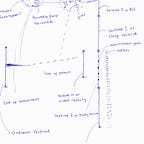Neurotechnology: Chaos of Thoughts in Mental Health
How much of thoughts can be controlled? Why, till now, is there no approximated measure of automatic and controlled thoughts in neuroscience, cognitive science and related fields per situation?
There are many scenarios where something is expected and thoughts gauge for it — like lifting a mass, paying attention, decision-making and so on, but most of the time, thoughts, without boundary command and drive the mind as they choose.
The command center of thought is the memory. Each thought carries the power to go to a destination to result in feeling effect — happy, lonely, fear, and so on.
Automatic and controlled cognition vary in rigidity and flexibility, still they depend on what has been picked up by the memory. There are sounds in a location that would automatically cause panic for people who grew up there that would mean nothing to others from elsewhere at the same time.
Automatic is subjective.
How does the memory pick and give thoughts? Superior to automatic and controlled thoughts are active and passive thoughts. Active thoughts are thoughts of the highest attention on the mind at any point. Passive thoughts are continuous thoughts that could switch to active.
It is with active and passive thoughts, theoretically, that the memory determines automatic and controlled thoughts. When a feeling effect comes from an active thought, other active thoughts may go to that destination, the effect remains, until one moves it.
Since passive thoughts are numerous, most automatic processes stay there, continuing till necessity to become active. Multiple senses come in all the time, but thought equivalent of most senses becomes passive thoughts, with just one getting absolute priority — or active — at any moment.
Interchanges of active thought, within the fraction of a second can be said to be responsible for thoughts as the chaos of mental health.
Thoughts emerge, the memory gives a freeway, what an individual feels, acts or assumes, may sometimes be too much to bear.
Most interventions of mind — approved or not — are to empower controlled thoughts.
So why not seek measurement?
What does progress mean for mental care? What else in a specific direction is sought among several complications of mind?
Cognitive technology could provide a path towards immersion into the pathways of thought in the brain as a way to extract all the possible opportunities for controlled thoughts for cognitive reframing or restructuring, from distortion from thoughts.
